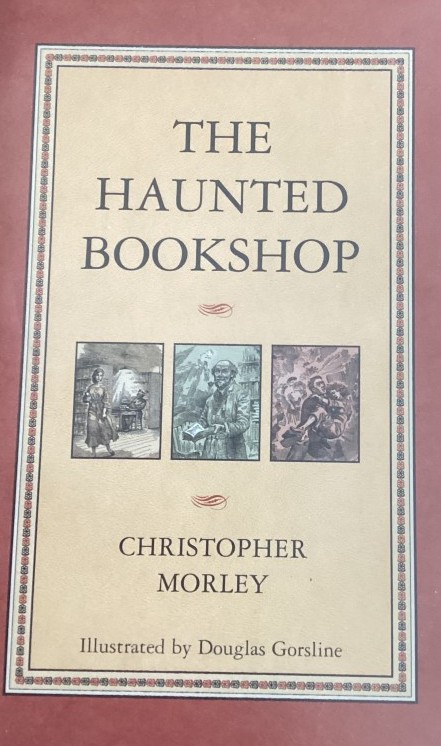Inspiring Older Readers
 posted on 29 Jun 2025
posted on 29 Jun 2025
The Haunted Bookshop by Christopher Morley
At the back end of 2021, I reviewed U.S. author, Christopher Morley’s first novel, Parnassus on Wheels (1917) which was an aimable little adventure based around a mobile bookstore. As I pointed out in that earlier review, Morley was a lifelong advocate for books and expanding the reading of books but it is this biblio-mystery, The Haunted Bookshop (1919), that he is probably most famous for. It is frequently touted as one of the earliest ‘biblio-mysteries’ and has certainly been influential in that genre.
Parnassus on Wheels introduced us to the delightfully eccentric Roger Mifflin, then owner of the mobile shop, who meets his soon-to-be wife, Helen during the course of the action. Now the two of them are back as proprietors of The Haunted Bookshop. Not, we soon discover, because the shop has any supernatural infestations – it’s a name that comes from the pervasive spirits of great literature that ‘haunt’ the shop.
Mifflin is an inveterately clubbable man and hosts a circle of friends who regularly visit the shop to chat, smoke (smoking is BIG in this book) and consider all things literary. As an act of friendship he agrees to take on Titania, the daughter of his friend Chapman, as a sort of apprentice in order to give this otherwise rather unworldly young women some ‘real-world’ experience.
At the same time, Mifflin’s shop has been visited by an over-enthusiastic advertising copyright salesman, Aubery Gilbert, hoping to drum up new business. As it happens, the father of Titania is one of Gilbert’s best customers and while hanging around in the shop he, of course, sees Titania and immediately falls in love with her.
In the first half of the book, the story rather stumbles along with a sort of heavily-dated amiability but things start to pep-up when we discover there’s a bit of a mystery about a book - Letters and Speeches of Oliver Cromwell – that appears and disappears from the shelves and in which an odd series of notes can be found.
Gilbert begins to think Titania is in danger in this odd environment and takes a room across the road from the bookshop in order to keep an eye on her. He leaps to all sorts of misplaced assumptions about what’s going on but gradually a genuine and rather sinister plot does in fact begin to emerge – and one that presents real jeopardy to everyone in the Haunted Bookshop.
I’m not going to unveil any more of the plot because that will certainly be a spoiler but the date of publication (1919) might give you a clue about who is behind the sinister goings-on.
As I suggested earlier in this review, as in Parnassus on Wheels, Morley’s prose is very dated and, at times, oddly stilted but as he gets into his stride and the mystery emerges, he gets into his stride and its all rather engaging and moves along at a decent pace. But, if you’re looking for 21st century sensibilities around gender or health and well-being, you’re in the wrong place: casual sexism, a bit of gentle racism and eulogies to the delights of smoking pack the pages. Try and look past them.
Copies of the book aren’t as easy to find as you might have thought but you’ll get one for under £20 if you’re tempted.
Terry Potter
June 2025